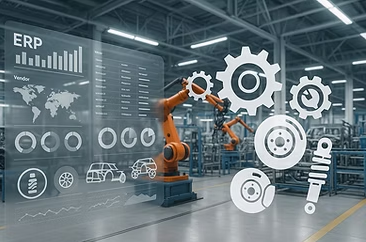In an era defined by digital transformation, education stands as one of the most disrupted and rapidly evolving sectors. The emergence of EdTech—Education Technology—has reimagined how knowledge is delivered, accessed, and personalized. At the heart of this revolution is a powerful enabler: EdTech AI engineering services. These advanced services are shaping a new education paradigm through intelligent systems that automate, personalize, and optimize the learning experience.
The Growing Need for AI in EdTech
As digital learning platforms scale globally, they face a dual challenge—delivering quality education to diverse learners while managing increasing volumes of content, data, and administrative complexity. Traditional EdTech platforms, while effective in delivery, struggle with issues like learner disengagement, static content, and manual operational overheads. Enter Artificial Intelligence.
AI-powered EdTech solutions bring agility, intelligence, and scalability to the learning ecosystem. Whether it’s AI for learner engagement and personalization or automated curriculum design with AI, the application of AI is not just beneficial—it’s becoming essential.
How EdTech AI Engineering Services are Transforming Education
EdTech AI engineering services encompass a wide spectrum of tools, frameworks, and strategies designed to infuse intelligence into educational platforms. These services help institutions, content creators, and EdTech companies build smarter products faster while ensuring scalability, quality, and learner-centricity.
Let’s break down the most impactful AI-driven innovations in the EdTech space:
1. AI in Educational Content Creation
One of the most resource-intensive aspects of digital learning is content generation. With AI, educators and institutions can create vast amounts of engaging, accurate, and tailored learning material quickly. This includes AI-generated course content for EdTech, where generative algorithms design interactive modules, assessments, and multimedia content aligned with learning outcomes.
Platforms integrated with generative AI for operational efficiency can update outdated content in real-time or tailor modules to specific demographics without manual effort. These capabilities save time while maintaining high educational standards.
2. Automated Curriculum Design with AI
Designing a curriculum that adapts to both pedagogical goals and learner preferences is a complex task. AI automates this by analyzing historical learning data, identifying skill gaps, and mapping content to appropriate standards.
Automated curriculum design with AI ensures that courses are structured logically, outcomes are aligned, and students are presented with the right content at the right time. This automation dramatically reduces the time educators spend on planning and allows for real-time curriculum optimization.
3. AI for Learner Engagement and Personalization
Personalization is the linchpin of modern education. Today’s learners expect experiences tailored to their pace, interests, and goals. AI can analyze performance data, behavioral patterns, and preferences to personalize learning paths.
Through AI for learner engagement and personalization, students receive recommendations for supplemental material, adaptive assessments, and real-time feedback. Such dynamic tailoring improves retention, motivation, and academic outcomes.
One remarkable development is the use of agentic AI for enterprise automation within educational institutions—automating backend processes like grading, analytics, student support, and learning interventions based on individual progress.
4. Ensuring Quality with AI Data Agents and Validation Tools
With the increasing reliance on AI-generated and automated content, ensuring data integrity and instructional quality becomes critical. This is where AI data agents for quality and governance come into play. These agents actively monitor content accuracy, compliance with educational standards, and consistency across learning modules.
Additionally, AI-powered data validation tools verify the correctness of learner analytics, engagement metrics, and assessment results, ensuring that decision-making is based on clean, reliable data.
5. Rapid Troubleshooting with Low-Code AI Remediation Platforms
As platforms scale, issues ranging from content bugs to learner drop-offs emerge frequently. Low-code AI remediation platforms allow educators and administrators to diagnose and address these problems without needing deep technical expertise.
Whether it’s flagging confusing quiz logic or correcting AI content generation errors, low-code interfaces empower teams to act quickly and improve the learner experience continuously.
Why Partnering with the Right AI Engineering Company Matters
While AI offers immense potential, harnessing it effectively requires specialized expertise in data engineering, model development, educational psychology, and software architecture. That’s why choosing the right AI partner is vital.
One standout in the domain is Discover Alpha—a trusted leader in AI and Data Engineering services. With a strong track record of building scalable, intelligent, and user-centric EdTech solutions, Discover Alpha brings together cross-functional talent to engineer AI systems that deliver real educational impact.
Discover Alpha’s approach integrates the full AI lifecycle—from data ingestion and model design to deployment and continuous improvement—making it a top choice for EdTech startups, institutions, and content creators looking to build the future of education.
The Future of EdTech is AI-Driven
As AI becomes more embedded in educational platforms, we can expect seismic shifts:
-
Real-time learning analytics for predictive intervention
-
Fully adaptive learning journeys
-
Peer and mentor matching powered by behavior models
-
Voice and NLP-based interactive tutors
-
Microlearning content generated on-demand
-
Virtual classroom orchestration via agentic AI
These transformations are no longer theoretical—they are actively being built today, powered by robust EdTech AI engineering services and forward-thinking partners like Discover Alpha.
Final Thoughts
AI is no longer a buzzword in EdTech—it is the engine powering its evolution. By leveraging innovations such as AI in educational content creation, automated curriculum design with AI, and AI for learner engagement and personalization, educators can meet the demands of modern learners while operating at scale.
With tools like AI-powered data validation, low-code AI remediation platforms, and AI data agents for quality and governance, the infrastructure behind these solutions becomes smarter and more reliable.
In this landscape, Discover Alpha stands out not just as a service provider, but as a strategic partner empowering the future of education.





More Stories
Septic Tank Pumping Los Angeles: What Every Property Owner Should Know
Party Strippers in Scottsdale: Your Guide to the Best Scottsdale Party Strippers
Vending Machine for Sale: Your Complete Guide to Starting a Profitable Vending Business